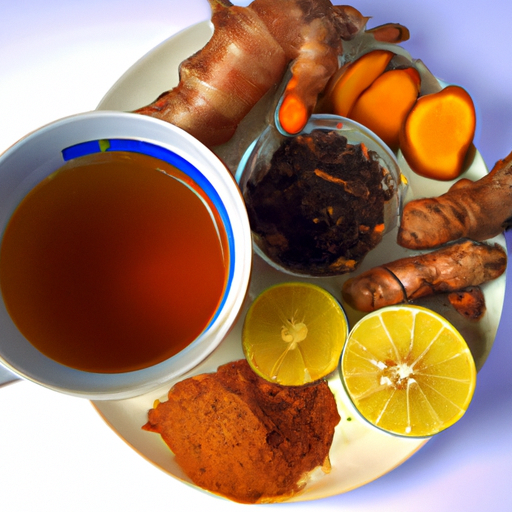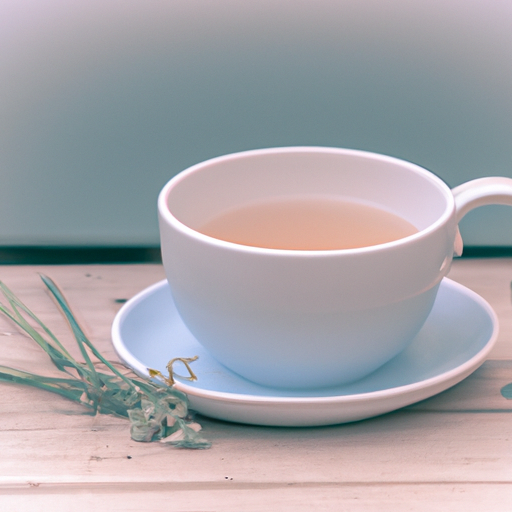For many years, I’ve enthusiastically consumed turmeric tea, and I can vouch for its wide array of health advantages. Turmeric, a potent spice known for its anti-inflammatory and antioxidant properties, has a long history of use in Ayurvedic healing practices. It’s recognized for enhancing cognitive abilities, cutting down the chances of heart disease, and helping alleviate depression symptoms.
But when is the best time to drink turmeric tea? As someone who has experimented with different times of day, I can confidently say that there are certain times that work better than others.
In this article, I will share my personal experience and research on the best times to consume turmeric tea for maximum health benefits. So whether you’re a seasoned turmeric tea drinker or just getting started, read on to find out when you should be sipping this golden elixir.
Key Takeaways
- Turmeric tea can be consumed at different times of the day for different health benefits, such as in the morning for increased immunity and brain function, in the afternoon for reducing inflammation and pain, and before bed for reducing joint pain and stiffness.
- Adding honey or lemon can improve the taste of turmeric tea and provide additional health benefits.
- Turmeric tea has digestive benefits, such as reducing inflammation in the gut, stimulating bile production, aiding digestion and absorption of nutrients, and increasing energy production.
- While turmeric tea has many health benefits, excessive consumption can lead to gastrointestinal issues, and it is important to consult with a healthcare provider before incorporating turmeric into the diet if there are any medical conditions or medications.
The Benefits of Turmeric Tea
You’ll be amazed at the incredible benefits you can experience from drinking turmeric tea, from reducing inflammation to improving brain function! Turmeric tea is a great way to incorporate this superfood into your daily routine.
The health benefits of turmeric tea range from aiding digestion, easing joint pain and arthritis, boosting immunity, promoting healthy skin and hair, and even fighting depression. The secret behind these numerous health benefits lies in the active ingredient present in turmeric – curcumin.
Curcumin is known for its anti-inflammatory and antioxidant properties that help combat chronic diseases such as cancer, diabetes, Alzheimer’s disease, among others. To reap the full benefits of curcumin in turmeric tea, it is crucial to brew it correctly.
One easy way is to bring water to a boil and then add 1/2 teaspoon of ground or grated fresh turmeric root per cup of water. Let it simmer for 10-15 minutes before straining.
Drinking turmeric tea at the right time can enhance its positive effects on your body. For instance, drinking a cup of warm turmeric tea before bed can improve sleep quality by calming your mind and relaxing muscles. Drinking it after meals can aid digestion by stimulating bile production that helps break down fats in food.
Additionally, consuming a cup of turmeric tea before or after exercise may reduce muscle soreness due to its anti-inflammatory properties. So go ahead and enjoy sipping on this delicious beverage while reaping its myriad benefits!
The Best Times to Drink Turmeric Tea
I love drinking turmeric tea because of its numerous health benefits. However, I recently realized that the timing of when I drink it can also affect how effective it is.
After doing some research, I discovered that the best times to drink turmeric tea are in the morning, afternoon, and evening – each with their unique benefits.
Read on to learn more about the optimal times to consume this delicious and healthy beverage.
Morning
Starting my morning with a warm cup of turmeric tea can provide numerous health benefits. The unique blend of antioxidants and anti-inflammatory compounds in turmeric can help boost immunity, fight off infections, and reduce inflammation throughout the body. Additionally, studies have shown that turmeric may increase concentration and improve brain function, making it a great choice for starting the day on a focused note.
To make the most out of my morning turmeric tea routine, I like to pair it with some healthy breakfast choices such as whole-grain toast or scrambled eggs. This helps me stay energized and focused throughout the day.
As I move into the afternoon hours, I find that continuing to sip on turmeric tea helps keep me alert and motivated without feeling overly stimulated.
Afternoon
Feeling sluggish in the afternoon? How about adding some spice to your routine with a warm, soothing beverage? Turmeric tea benefits aren’t just limited to the morning – drinking it in the afternoon can also give you an energy boost and improve your overall sense of well-being.
Turmeric is known for its anti-inflammatory properties, which can help reduce inflammation and pain in the body. This makes it a great choice for an afternoon pick me up, especially if you’ve been sitting at a desk all day or have been engaging in physical activity.
Additionally, turmeric contains antioxidants that can help protect your cells from damage caused by free radicals. Adding a little honey or lemon to your turmeric tea can also provide additional health benefits and make it taste even better!
Looking for another way to unwind after a long day? Let’s explore how drinking turmeric tea before bed can benefit your health.
Evening
Unwind after a long day with the soothing benefits of turmeric tea before bed, helping you feel relaxed and rejuvenated for a good night’s sleep. The evening is the perfect time to enjoy turmeric tea, which can provide numerous health benefits. Turmeric contains curcumin, which has anti-inflammatory properties that can help reduce joint pain and stiffness. It also helps boost the immune system and improve digestion.
To reap these benefits, it is important to consume turmeric in adequate dosage. A recommended daily dose of turmeric is 500-2000mg per day, or about 1-2 teaspoons per cup of tea. However, it is important to keep in mind that excessive consumption of turmeric can lead to side effects such as stomach upset or even ulcers. There are also various variations and recipes for making turmeric tea depending on personal preference; some people prefer adding honey or ginger while others like their tea plain.
In the morning, drinking turmeric tea can help jumpstart your day with its energizing properties. So why not try incorporating this healthy beverage into your daily routine?
Drinking Turmeric Tea in the Morning
I personally love drinking turmeric tea in the morning because it helps boost my energy and metabolism for the day ahead. Turmeric contains curcumin, which has been shown to increase metabolic rate and enhance fat burning.
Additionally, turmeric can aid in digestion by reducing inflammation in the gut and promoting healthy gut bacteria. So, starting your day with a warm cup of turmeric tea can provide numerous health benefits.
Boosting Energy and Metabolism
Drinking turmeric tea can increase your energy levels and metabolism. Studies show that daily consumption can lead to a 16% increase in metabolic rate. Here are some ways that turmeric tea can help boost your energy and metabolism:
- Turmeric tea can aid in weight management by reducing inflammation and improving insulin sensitivity. By adding it to your daily routine, you may support healthy weight loss.
- Turmeric tea may improve brain function and mental clarity. Studies have linked curcumin with improved memory and attention span, making it a great choice for those looking to stay focused throughout the day.
By incorporating turmeric tea into your daily routine, you may experience increased energy levels and improved metabolism. This will not only help with weight management but also promote overall health and wellness.
Moving on to supporting digestion…
Supporting Digestion
Boost your digestive health with the powerful benefits of turmeric. This spice has been used for centuries in traditional medicine as a digestive aid, and modern research has confirmed its effectiveness.
Turmeric’s active compound, curcumin, helps to reduce inflammation in the digestive tract and stimulate the production of bile, which aids in digestion. To maximize the digestive benefits of turmeric tea, it’s best to drink it before or after meals.
Drinking turmeric tea 30 minutes before a meal can help to stimulate the appetite and prepare the digestive system for food. On the other hand, drinking turmeric tea after a meal can help to relieve bloating and promote healthy digestion.
However, if you have any medical conditions or are taking medication, it’s important to consult with your healthcare provider before incorporating turmeric into your diet. Drinking turmeric tea in the afternoon can also provide an energy boost without disrupting sleep patterns like caffeine does.
In fact, many people find that drinking turmeric tea in the afternoon helps them to stay focused and productive throughout their workday. So why not brew up a cup of this delicious and nutritious beverage today?
Drinking Turmeric Tea in the Afternoon
Hey, lazy bones! Want to perk up your afternoon without caffeine? Try sipping on some turmeric tea instead. Turmeric is a spice that has been used for centuries in traditional medicine and cooking. It contains a compound called curcumin, which has anti-inflammatory properties and can help improve digestion. So, if you’re feeling the afternoon slump and need a boost of energy to increase productivity, turmeric tea may be just what you need.
But how exactly does drinking turmeric tea in the afternoon help with boosting productivity? Let’s take a look at this table below:
| Benefit | Explanation | How it helps |
|---|---|---|
| Anti-inflammatory | Turmeric contains curcumin, which has anti-inflammatory properties that can reduce inflammation in the body | Reducing inflammation can help improve focus and mental clarity |
| Digestive aid | Curcumin also stimulates bile production, which aids in digestion and absorption of nutrients from food | Better digestion means more nutrients are available for energy production |
| Immune booster | Curcumin has been shown to have immune-boosting effects by stimulating immune cells in the body | A stronger immune system means fewer sick days and more time for work |
As you can see, there are several benefits to drinking turmeric tea in the afternoon. Its anti-inflammatory properties can help reduce brain fog and promote mental clarity, while its digestive aid properties ensure that your body is getting all the necessary nutrients it needs to maintain energy levels. Plus, its immune-boosting effects mean you’ll be less likely to get sick during cold and flu season.
Now that we’ve covered how drinking turmeric tea in the afternoon can benefit your productivity levels let’s move on to how it can benefit your evening routine without disrupting sleep.
Drinking Turmeric Tea in the Evening
In the evenings, I enjoy drinking a warm cup of turmeric tea before bed. Not only does it promote relaxation and help me sleep better, but it also has anti-inflammatory properties that can reduce joint pain.
Research suggests that curcumin, the active compound in turmeric, may help reduce inflammation in the body and improve overall health. So if you’re looking for a natural way to unwind at night and alleviate any discomfort in your joints, consider adding turmeric tea to your evening routine.
Promoting Relaxation and Sleep
For a soothing bedtime ritual, try sipping on turmeric tea to promote relaxation and restful sleep. Turmeric’s anti-inflammatory properties can help reduce stress and anxiety levels, while the compound curcumin found in turmeric has been shown to improve mood and enhance sleep quality.
Incorporating relaxation techniques into your bedtime routine can also further promote better sleep. Along with drinking turmeric tea, consider practicing deep breathing exercises or meditation before bed. Creating a calming environment by dimming lights and reducing noise levels can also aid in promoting relaxation for a more peaceful night’s rest.
Reducing inflammation and joint pain is another benefit of drinking turmeric tea regularly. Incorporating this healthy beverage into your daily routine not only promotes relaxation and sleep but also supports overall wellness.
Reducing Inflammation and Joint Pain
If you’re looking for a natural way to ease joint pain and reduce inflammation, incorporating turmeric into your diet could be a helpful solution. Turmeric contains curcumin, which has been shown to have anti-inflammatory properties. Inflammation is the body’s natural response to injury or infection, but it can also contribute to chronic diseases such as arthritis and heart disease. By reducing inflammation, turmeric may help alleviate symptoms of joint pain and stiffness.
Dietary supplements are one way to incorporate turmeric into your diet. However, it’s important to note that not all supplements are created equal. Some may contain additives or have lower quality ingredients than others. It’s best to choose a reputable brand with third-party testing to ensure purity and potency. Another way to consume turmeric is by adding it directly into your meals or making turmeric tea. Both methods can provide the benefits of reducing inflammation without the potential risks of dietary supplements.
Speaking of making turmeric tea, let’s explore how you can prepare this delicious beverage in the next section!
Preparing Turmeric Tea
When making turmeric tea, it’s important to choose the right ingredients for optimal health benefits. I usually use fresh turmeric root, ginger, black pepper, and cinnamon for my brew. The brewing method is also crucial in extracting the maximum amount of curcumin from the turmeric, so I like to simmer it on low heat for about 10 minutes.
Additionally, adding natural flavorings and sweeteners can enhance the taste and make it more enjoyable to drink regularly.
Choosing the Right Ingredients
To ensure you get the most health benefits from your turmeric tea, it’s important to carefully choose high-quality ingredients. When selecting ingredients for your turmeric tea, start with fresh turmeric root or a high-quality ground turmeric powder. Look for organic varieties that are free of additives and preservatives. Fresh ginger is another key ingredient in making a delicious and healthy turmeric tea.
In addition to these core ingredients, there are many other spices and herbs that can be added to enhance the flavor and health benefits of your turmeric tea. Some popular additions include cinnamon, black pepper, cardamom, cloves, and honey. To help you choose the right combination of ingredients for your perfect cup of turmeric tea, consider the following table:
| Ingredient | Benefit | Flavor Profile |
|---|---|---|
| Turmeric | Anti-inflammatory properties | Earthy |
| Ginger | Digestive support | Spicy |
| Cinnamon | Antioxidant properties | Sweet & Spicy |
| Black Pepper | Enhances absorption of curcumin in turmeric | Pungent |
With these tips and ingredient suggestions in mind, you can create a delicious and healthy cup of turmeric tea that suits your taste preferences and health goals. In the next section we’ll look at different brewing methods to make sure you’re getting maximum flavor and nutrients from your chosen ingredients.
Brewing Methods
Now that we’ve discussed the importance of choosing the right ingredients for your turmeric tea, let’s move on to the brewing methods. After all, how you prepare your tea can greatly affect its taste and nutritional benefits.
First, it’s important to note that the ideal temperature for brewing turmeric tea is between 160-180°F (70-82°C). Boiling water can destroy some of the beneficial compounds found in turmeric, so it’s best to avoid using boiling water. Additionally, steeping time should be around 10-15 minutes to allow the flavors and nutrients to fully infuse into the water.
When discussing brewing methods for turmeric tea, it’s crucial to pay attention to both temperature and steeping time. By following these guidelines, you’ll ensure that your tea is not only flavorful but also packed with health benefits.
Moving forward, let’s dive into how you can add flavor and natural sweeteners to your turmeric tea without compromising its nutritional value.
Adding Flavor and Sweeteners
If you’re looking to enhance the taste of your turmeric tea, infusing spices is a great way to add flavor. Some common spices that pair well with turmeric include ginger, cinnamon, and cardamom. To infuse these spices into your turmeric tea, simply add them to the pot or cup while brewing. You can also steep them in hot water before adding the turmeric for an even stronger flavor.
In addition to spices, natural sweeteners such as honey or maple syrup can also improve the taste of your turmeric tea. These sweeteners not only add sweetness but also provide additional health benefits. Keep in mind that added sugar should be avoided as it can offset the health benefits of drinking turmeric tea.
Overall, by incorporating these simple tips, you can enjoy a delicious and healthy cup of turmeric tea any time of day.
Moving on from enhancing the taste of your turmeric beverage with natural sweeteners and infused spices, it’s important to consider the potential side effects associated with consuming too much turmeric.
Turmeric Tea Side Effects
You might experience gastrointestinal issues like nausea or diarrhea from drinking too much turmeric tea because turmeric contains curcumin, which has a laxative effect in high doses.
To avoid these side effects, it’s important to stick to the recommended turmeric tea dosage, which is typically one teaspoon of ground turmeric per cup of water.
If you’re pregnant or nursing, it’s also important to be cautious when consuming turmeric tea. While there’s limited research on the effects of curcumin during pregnancy and breastfeeding, some studies suggest that it may have hormonal effects and could potentially stimulate contractions. As such, it’s generally recommended that pregnant and nursing women avoid consuming large amounts of turmeric or taking curcumin supplements.
Considering the potential side effects of consuming too much turmeric tea, it may be worth exploring other ways to incorporate this powerful spice into your diet. Turmeric supplements offer a convenient alternative for those who want the benefits of curcumin without having to drink multiple cups of tea throughout the day. However, before starting any new supplement regimen, it’s always best to speak with your healthcare provider first.
Turmeric Supplements vs. Turmeric Tea
Feeling overwhelmed with the amount of turmeric tea you’d need to drink for its health benefits? Turmeric supplements offer a convenient and efficient way to get your daily dose without having to consume copious amounts of tea.
These supplements come in various forms, including capsules, powders, and extracts. While they may not have the same aroma and taste as turmeric tea, they’re just as effective.
Turmeric supplements contain curcumin, which is the active ingredient in turmeric responsible for its health benefits. Curcumin has anti-inflammatory properties that can help relieve pain and inflammation in the body. It also has antioxidant properties that can protect against oxidative stress caused by free radicals.
However, it’s important to note that while turmeric supplements can offer many benefits, they’re not a substitute for a healthy diet and lifestyle. Drinking turmeric tea regularly along with taking supplements can help maximize its beneficial effects on your health.
In the next section, we’ll take a closer look at how to choose the right type of turmeric tea for your needs.
Choosing the Right Turmeric Tea
When it comes to choosing the right turmeric tea, there are a few key factors to consider.
For me, the first thing I look for is whether the tea is organic or non-organic.
Then, I consider the blends and flavors available.
Finally, quality and sourcing are important considerations to ensure that you’re getting a high-quality product with all of the health benefits you’re looking for.
Make sure you’re choosing the best turmeric tea for your needs!
Organic vs. Non-Organic
Although it may be more expensive, opting for organic turmeric can provide a higher quality and more sustainable option when making turmeric tea. Choosing organic options ensures that the turmeric has been grown without harmful pesticides or chemicals, which can have negative effects on human health. Additionally, organic farming practices prioritize soil health and biodiversity, creating a healthier ecosystem for both plants and animals.
Here are some benefits of choosing organic turmeric for your tea:
- Organic farming methods promote healthier soil by avoiding synthetic fertilizers and other harmful chemicals.
- Organic turmeric is free from genetically modified organisms (GMOs) which can be detrimental to human health.
- Supporting organic agriculture helps reduce pollution in our environment.
- Choosing organic products supports farmers who use sustainable practices to produce wholesome food.
Transitioning into the subsequent section about blends and flavors, it’s important to note that while choosing the right blend or flavor is important in enjoying your cup of turmeric tea, selecting an organic option should always be prioritized for its numerous health benefits.
Blends and Flavors
To truly elevate your tea experience, you’ll want to explore the diverse range of tantalizing blends and flavors that can take your taste buds on a journey.
When it comes to turmeric tea blends, there are many unique turmeric flavors out there waiting to be discovered. Some blends might incorporate ginger or cinnamon for an extra kick of spice, while others might include honey or lemon for a touch of sweetness.
Not only do these flavor combinations add depth and complexity to the taste of your turmeric tea, but they also offer additional health benefits. Ginger has anti-inflammatory properties like turmeric, while cinnamon can help regulate blood sugar levels.
With so many unique turmeric flavors available in different blends, it’s worth trying a few to find one that suits your tastes and health needs best.
As you explore different blends and flavors of turmeric tea, it’s important to consider the quality and sourcing of the ingredients used. This will ensure that you’re getting the most potent dose of curcumin – the active compound in turmeric – as well as avoiding any harmful additives or pesticides.
Quality and Sourcing
If you want to ensure that the turmeric tea you’re consuming has potent levels of curcumin and is free of harmful additives, it’s important to pay attention to the quality and sourcing of its ingredients.
Sourcing standards and ethical practices should be top priorities when choosing a brand or supplier. Look for companies that prioritize fair trade practices, organic farming methods, and transparency in their sourcing.
When it comes to quality, look for turmeric that is high in curcumin content. Curcumin is the active ingredient in turmeric responsible for its anti-inflammatory properties. Choose brands or suppliers that have their products tested by third-party labs to verify potency levels.
Don’t settle for lower quality options just because they are cheaper – investing in higher quality turmeric will ultimately benefit your health in the long run.
Frequently Asked Questions
Can pregnant women drink turmeric tea?
As a pregnant woman, I was curious about the safety of drinking turmeric tea.
After researching, I found that turmeric tea benefits include reducing inflammation and boosting immunity.
However, it’s important to note that consuming large amounts of turmeric during pregnancy may increase the risk of miscarriage or preterm birth.
It’s always best to consult with a healthcare provider before adding any new supplement or food to your diet while pregnant.
If you’re looking for alternatives to turmeric tea during pregnancy, consider ginger tea which also has anti-inflammatory properties and is generally considered safe in moderation.
How much turmeric tea should I drink in a day?
When it comes to the amount of turmeric tea you should drink in a day, it’s important to note that moderation is key.
While turmeric tea benefits your health in numerous ways, excessive consumption can have adverse effects on your body.
The recommended turmeric tea dosage varies depending on factors like age, gender, weight, and overall health status.
As a general guideline, most adults can safely consume up to 3 grams of turmeric per day. This translates to around one teaspoon of ground turmeric or two heaped teaspoons of freshly grated turmeric root brewed into a cup of hot water for making turmeric tea.
However, pregnant women and people with certain medical conditions should consult with their healthcare provider before adding turmeric tea to their daily routine as it may interfere with some medications or cause complications during pregnancy.
Can turmeric tea help with weight loss?
Did you know that obesity affects over 650 million adults worldwide? If you’re trying to lose weight, turmeric tea recipes may be just what you need.
Turmeric has been shown to have anti-inflammatory and antioxidant properties, which can help reduce inflammation in the body and improve overall health. Additionally, studies have found that curcumin, the active ingredient in turmeric, may aid in weight loss by increasing metabolism and reducing fat accumulation.
Not only that, but turmeric also has benefits for skin health, such as improving acne and reducing signs of aging. So why not try incorporating turmeric tea into your daily routine as a natural and delicious way to support your weight loss goals while promoting healthy skin?
Can turmeric tea help with inflammation?
Turmeric tea has numerous health benefits, including its ability to reduce inflammation in the body. This is due to the presence of curcumin, which is a powerful anti-inflammatory agent.
Drinking turmeric tea regularly can help alleviate joint pain, lower the risk of chronic diseases such as cancer and heart disease, and improve overall skin health.
There are many recipes for making turmeric tea, but it’s important to ensure that you use high-quality ingredients and steep it properly for maximum benefits.
While there isn’t necessarily a specific time that’s best to drink turmeric tea, incorporating it into your daily routine can lead to significant improvements in your overall health and well-being.
So why not try adding this delicious beverage into your diet today?
Can turmeric tea interfere with medication?
When it comes to medication, it’s always best to consult with your healthcare provider before adding anything new to your routine. That being said, turmeric tea benefits are numerous and can be a great addition to any wellness regimen.
When brewing turmeric tea, it’s important to add black pepper or ginger for optimal absorption of its active ingredient, curcumin. As for comparisons with other herbal teas, turmeric tea has been found to have stronger anti-inflammatory effects than chamomile or green tea.
However, if you’re on blood-thinning medication or have gallbladder issues, it’s important to talk with your doctor as turmeric may interfere with these conditions. Ultimately, incorporating turmeric tea into a balanced diet and lifestyle can provide many health benefits and should be considered as part of a holistic approach to wellness.
Conclusion
In conclusion, after researching and trying out the best times to drink turmeric tea, I’ve found that incorporating it into my morning routine has been the most beneficial for me. Starting my day with a warm cup of turmeric tea not only helps kickstart my metabolism, but also provides anti-inflammatory benefits throughout the day.
According to a study published in The Journal of Alternative and Complementary Medicine, turmeric has been shown to be as effective as ibuprofen in reducing pain and inflammation in patients with osteoarthritis. This statistic adds depth and complexity to the numerous health benefits of turmeric tea.
It’s important to note that while turmeric tea is generally safe for consumption, it may interact with certain medications or cause side effects such as stomach upset or dizziness. Therefore, consulting with a healthcare professional before adding it to your daily routine is recommended.
Overall, incorporating turmeric tea into your daily routine can provide numerous health benefits. Whether you choose to drink it in the morning, afternoon, or evening, be sure to prepare it correctly and consider any potential side effects or drug interactions before consuming.










